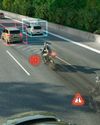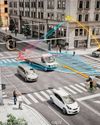Climate change today is one of the biggest concerns for humanity. The impacts of industrialisation and global warming have played a definitive role in the evolution of how businesses are done. In India, one of the foremost industrial groups to make strong commitments towards climate protection is the Mahindra Group. Spearheading the movement for the Mahindra Group is its Igatpuri facility, which recently declared its carbon neutral status without the purchase of carbon credits.

As per the Paris Agreement, nations collectively need to address concerns over rising global temperatures and work towards limiting it to well below 2 °C above pre-industrial levels and pursuing efforts to limit temperature increase to 1.5 °C above pre-industrial levels. The Paris Agreement recognises that in doing so, risks and impacts of climate change would be reduced significantly.
Working on the lines of the Paris Agreement, the IPCC (Intergovernmental Panel on Climate Change) prepared a special report in 2018 to highlight the impact of global warming of 1.5 °C above pre-industrial levels. The report indicated that human activities have brought about a rise in global temperatures by 1 °C above pre-industrial levels. It also suggests that global warming is likely to reach 1.5 °C between 2030 and 2052. According to the IPCC special report, warming from anthropogenic emissions will last for a century to millennia, causing long-term changes such as rise in ocean levels, drought in some regions, extreme heat in some and heavy precipitation in several regions.
Giving due importance to the issue, many companies have started to change the way they think and operate. The Climate Group, a non-profit organisation has been working in this area to facilitate and accelerate climate action with many companies. According to its reports, around 49 bn tonne of CO2 is released into the atmosphere every year, of which industry (32 %), buildings (18 %) and energy sectors (11 %) were the major contributors. The Climate Group recently initiated the EP 100 programme wherein it brings together companies that are committed to using energy more efficiently, lower greenhouse gasses and accelerate a clean economy.
This story is from the February 2019 edition of Auto Tech Review.
Start your 7-day Magzter GOLD free trial to access thousands of curated premium stories, and 9,000+ magazines and newspapers.
Already a subscriber ? Sign In
This story is from the February 2019 edition of Auto Tech Review.
Start your 7-day Magzter GOLD free trial to access thousands of curated premium stories, and 9,000+ magazines and newspapers.
Already a subscriber? Sign In

Sound Generation For Enhanced Road Safety
With an ever-increasing number of fully electric and hybrid vehicles entering the market, we are witnessing a change in the acoustic experience in and around the car. The silent nature of the electric powertrain means that other road users miss the familiar acoustic cues that warn them of an approaching vehicle. To remedy this situation, Harman is working on various noise management solutions.

OBJECTIVE ASSESSMENT OF THE SAFETY CONTRIBUTION OF TODAY'S AUTOMOTIVE HEADLAMPS
Good lighting makes a major contribution to road safety. In 2011, the International Commission on Illumination (CIE) presented an evaluation system for headlamps that can objectively assess the quality of illumination and glare limitation. New light sources like LEDs and lighting functions (glare-free high beam, partial high beam) have been available for several years, so that an extension of the proven CIE method is necessary, which takes into account, among other things, changed switch-on and service lives of new lighting functions and represents a generally understandable evaluation system. An evaluation system presented in the following by the Technische Uni versität Darmstadt, which was developed by an encompassing expert commission, is intended to provide representative data and enable an objective evaluation of headlamp performance.

RAPIDO RE-INNOVATES TO CATER TO POST COVID-19 LAST MILE CONNECTIVITY
The rapid pace of urbanisation in the country has witnessed cities expanding and subsuming surrounding villages and smaller towns, evolving into Tier II and III cities.

FUNCTIONAL SAFETY STANDARDS TOP PRIORITY FOR FUTURE AUTOMOTIVE DEPLOYMENT
Increasing levels of electronic content in vehicles result in a large amount of software that is required to run the scenes behind the mechanical aspects of a vehicle. Electronic systems in automobiles are part of every section, from the powertrain to comfort and convenience systems as well as all types of safety equipment. This makes electronics and the software running these systems a critical part of the equation for future mobility solutions. In addition, putting standards in place to measure methods of developing, testing and functioning of such electronic systems also becomes highly relevant.

“BYD'S EV STRATEGY TO ENCOMPASS MOST FORMS OF TRANSPORTATION NEEDS IN INDIA”
The country’s electric vehicle (EV) ecosystem is grappling with a plethora of challenges even as it is striving to wriggle itself out of the ‘nascent stage’ tag. In an exclusive chat with Auto Tech Review, Zhang Jie Ketsu, Executive Director, BYD India shares his perspective on the current EV scenario and how the company intends to progress faster in the Indian automotive industry

SAFETY IN ELECTRIC AND AUTONOMOUS CARS – SIMULATION OF COMPLEX CRASH SCENARIOS
Electric and autonomous vehicles allow for novel seating arrangements and packaging strategies, presenting new safety challenges. Physical crash testing must be supplemented with virtual simulation to ensure vehicle safety on shorter development cycles. With its Simcenter Madymo MBS software, Siemens provides improved runtimes and the Active Human model, enabling accurate and rapid occupant safety analysis in complex crash scenarios.

KIA SONET – A MIGHTY OFFERING IN THE COMPACT SUV SEGMENT
It wouldn't be wrong to say that Kia Motors India has taken the Indian market by storm in less than 12 months of its presence in the market.

NISSAN'S NEW DIRECTION: ARIYA ALL-ELECTRIC
Marking a key milestone in Nissan’s transformation strategy, Ariya ticks a lot of boxes highlighting the strengths of the global automotive giant.

BETTER SAFETY WITH EMERGENCY BRAKE ASSIST FOR MOTORCYCLES
Rear-end collisions with a slower vehicle suddenly cutting into the lane and intersection accidents with cross-traffic are among the most frequent motorcycle accident types. Continental is now developing an emergency brake assist, which detects an imminent collision with a vehicle ahead or with an obstacle, warns the rider and supports him during braking

ADAS WILL SERVE AS CATALYST FOR IMPROVED VEHICLE SAFETY
The automotive industry across the globe is increasingly focussing on safety.